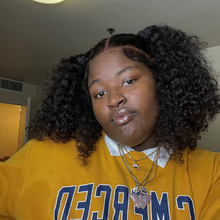Brana Phillips
She/Her/Hers
My name is Brana Phillips and I and from Los Angeles, CA. I am a full time student at University of California, Merced. My future goals are to become a Juvenile Probation Officer and a Children’s Therapist. My goal is important because it not just something that I’m interested in but being someone who has been impacted by the correctional system from first experience I thought could make a significant change. I joined the CARES project because as a former foster youth I feel as though it was my duty to join organizations and projects where I can share my lived experience.
#CARES4Power
Follow us on Instagram to learn more about our work, the CARES Ambassadors, and the policies we are building to advance change for all transition age youth.
Swipe left to understand the significance of the policy principle of Meaningful Employment featured in the National Policy Agenda, as described by Atlanta CARES Ambassador Jada and Los Angeles CARES Ambassador Joseph. These principles are crucial for our community`s progress and welfare.
.
.
.
.
#CARES #CARES4Power #NationalPolicyAgenda #CARESNationalPolicyAgenda #Employment #FosterYouth #Policy #Youth #YoungPeople #TAY #TransitionAgeYouth #Gainfulemployment

When woven into practice, cultural humility includes:
- An examination of one`s own biases.
- Open dialogue with families.
- Proactive efforts to level the playing field and address systemic inequities.
While race and culture are not synonymous, cultural humility with a racial equity lens can help address the stark racial disparities in the [child welfare] system and promote attention to the intersections of race and other cultural identities.
.
.
.
.
#classisinsession #KeyEquityTerms #CARES #CARESAmbassadors #Equity #CulturalHumility #ChildWelfare
![When woven into practice, cultural humility includes:
- An examination of one's own biases.
- Open dialogue with families.
- Proactive efforts to level the playing field and address systemic inequities.
While race and culture are not synonymous, cultural humility with a racial equity lens can help address the stark racial disparities in the [child welfare] system and promote attention to the intersections of race and other cultural identities.
.
.
.
.
#classisinsession #KeyEquityTerms #CARES #CARESAmbassadors #Equity #CulturalHumility #ChildWelfare](https://cares4power.org/wp-content/plugins/instagram-feed-pro/img/placeholder.png)
The Housing portion of the Policy Principles shared on https://cares4power.org/policy-agendas/housing/ emphasizes the need for safe, affordable, and stable housing for all individuals, particularly marginalized communities. These housing recommendations advocate for policies that prevent displacement, improve housing conditions, and ensure long-term affordability.
Swipe left to understand the significance of the policy principle of housing featured in the National Policy Agenda, as perceived by New York-based CARES Ambassador Andre. These principles are crucial for our community`s progress and welfare.
.
.
.
.
#CARES #CARES4Power #NationalPolicyAgenda #CARESNationalPolicyAgenda #Housing #FosterYouth #Policy #Youth #YoungPeople #TAY #TransitionAgeYouth

Skin-based privilege impacts all of our lives. Showing preference based on color is referred to as colorism. Colorism is based on a hierarchy of skin color, giving privilege to lighter skin tones while disempowering darker skin tones. Research suggests that colorism continues to be a problem across the US. According to The Grio, a study in Michigan found that out of 1,183 adoptive families, 42% of the adoptive parents` most recently adopted children were "very fair or somewhat fair" in skin color. At the same time, 31 percent were "somewhat dark or very dark."
.
.
.
.
#classisinsession #KeyEquityTerms #CARES #CARESAmbassadors #Equity #Colorism #ChildWelfare

Happy Friday! Culture (from the Latin cultura stemming from colere, meaning "to cultivate") generally refers to patterns of human activity and the symbolic structures that give such activities significance and importance. Cultural practices and values promote family well-being and improve child welfare outcomes. Strong ties with cultural, racial, and ethnic identities can build resilience and act as a buffer against the effects of trauma.
This series aims to expand the reach and use of many terms that appear in our work, lives, and communities.
.
.
.
.
#classisinsession #KeyEquityTerms #CARES #CARESAmbassadors #Equity #Culture #ChildWelfare

We all want children to be happy and healthy. Fortunately, research has confirmed what families already know about how to promote healthy and happy children. To read more about the research and to access the 2024 anti-trans bills tracker, please click the link in our bio!
.
.
.
.
#CSSP #CARES #Pride #HappyPrideMonth #PrideMonth #Equality #Equity

Happy Friday! We`re back with our "Key Equity Term" Series; today`s Key Equity Term is ✨Discrimination✨. This series aims to expand the reach and use of many terms that appear in our work, lives, and communities.
Discrimination fact: According to the American Bar Association, "Racial discrimination in U.S. child welfare is a human rights issue. On August 30, 2022, the UN Committee on the Elimination of Racial Discrimination (CERD), a group of international experts charged with monitoring state compliance with human rights obligations on racial discrimination, expressed concern at the `disproportionate number of children of racial and ethnic minorities removed from their families and placed in foster care` in the U.S. Stay tuned for new terms in the coming weeks, and if you have additions — let us know!
.
.
.
.
#Discrimination #classisinsession #KeyEquityTerms #CARES #CARESAmbassadors #KeyTerms #Wordoftheday #WOTD

Check out this #DITL with Atlanta Ambassador Vlad! Vlad took headshots for an interview for sponsors` of his team. He also grabbed a quick group photo with his teammates.
"The interview was for sponsors, to help see the changes they are fostering in the lives of youth like me. Their contributions make a real difference, and I am a testament to that. I’m currently part of the Columbus Elite FC team, where I’m honing my soccer skills. I’m proud to support the Fostering Success Act in Georgia. This initiative provides resources and support to young people aging out of the foster care system. As part of this program, they offer life coaches to help us succeed while enrolled in college."
.
.
.
.
#CARES #CARES4Power #ATL #ATLYouth #CARESAmbassador #NationalFosterCareAwarenessMonth #Georgia #Soccer #Sports


